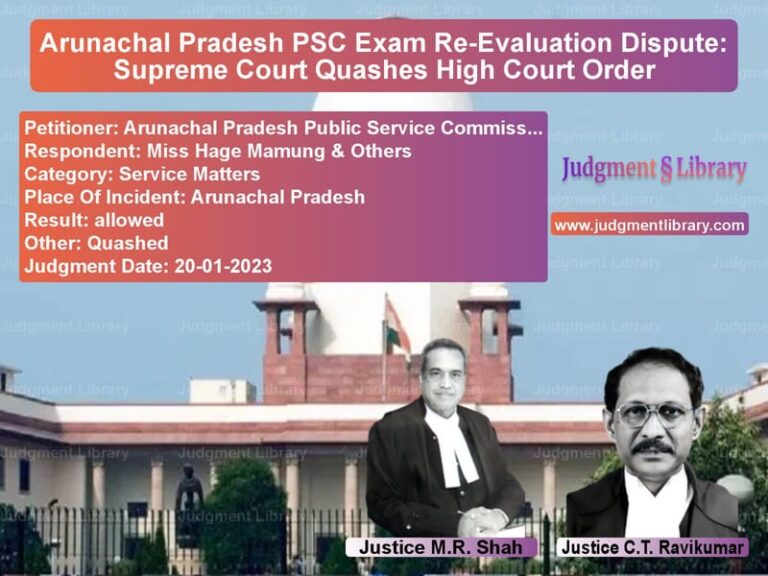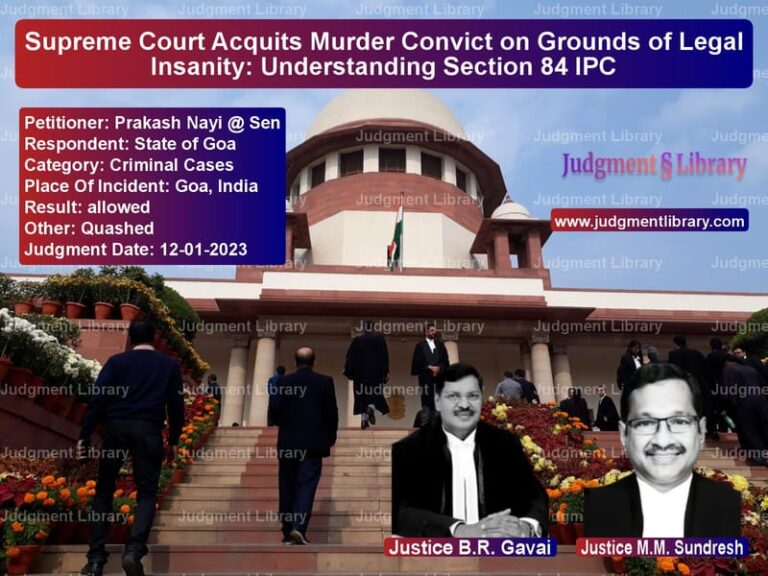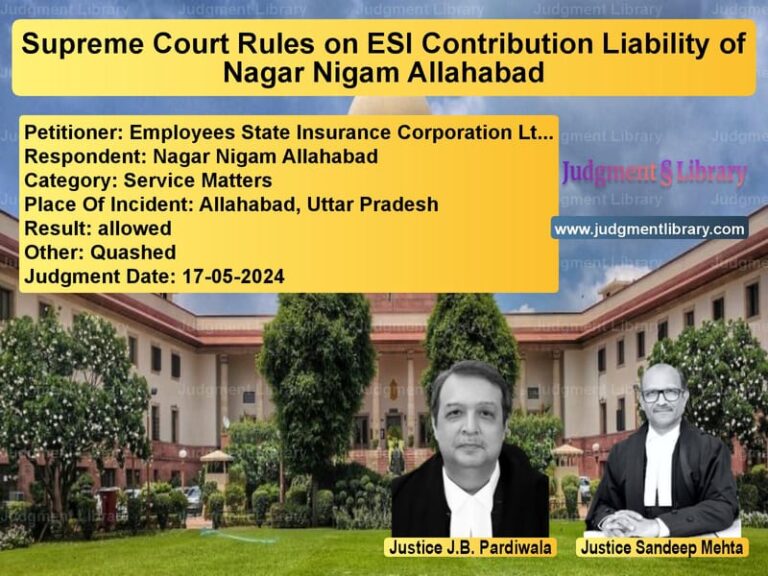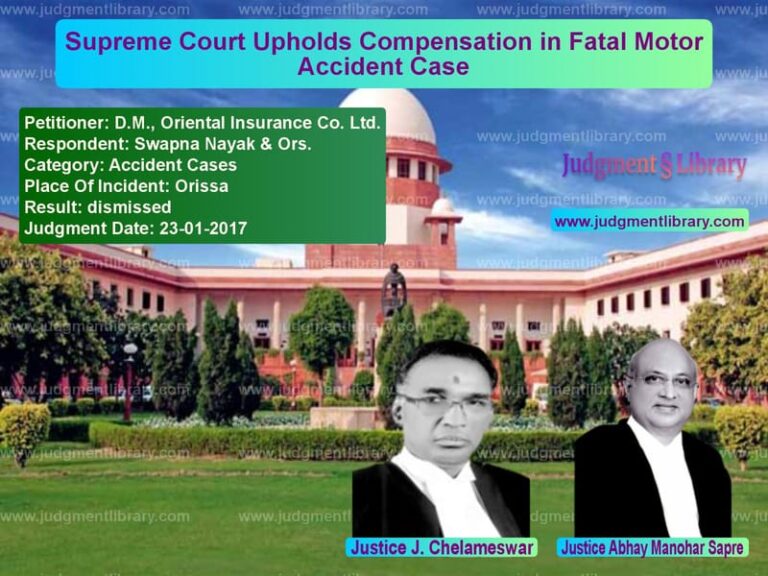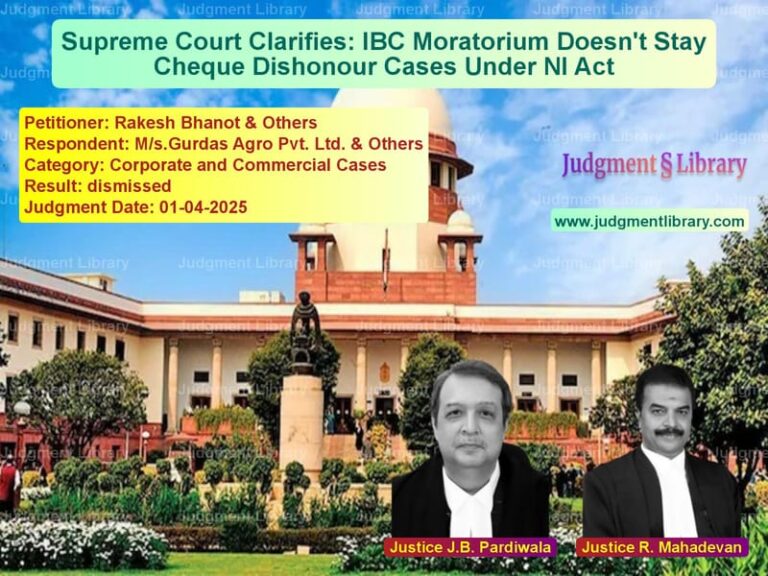Executing Court Must Ensure Possession in Land Dispute: Supreme Court’s Ruling on Encroachment
The Supreme Court of India recently delivered a significant judgment in the case of Smt. Ved Kumari (Dead Through Legal Representative) Dr. Vijay Agarwal v. Municipal Corporation of Delhi. The ruling addressed a long-standing property dispute involving execution of a decree for possession, clarifying the duties of an executing court when third-party encroachments are alleged.
Background of the Case
The dispute arose from a lease agreement entered into in 1973 between Smt. Ved Kumari and the Municipal Corporation of Delhi (MCD). The lease was for a piece of land measuring 400 square yards, located in Village Khureji Khas, Abani Radheypuri, Shahdara, Delhi. The lease expired in 1983, and despite a legal notice served on the MCD in 1987 demanding possession, the municipal body refused to vacate the premises.
Following this, the appellant filed a suit for possession in 1988, which was decreed in her favor in 1990. However, the execution of the decree proved to be a prolonged battle, with the MCD repeatedly resisting the handover of possession on various grounds, including claims that a school had been constructed on the disputed land and that unknown third-party encroachers had occupied the land.
Key Legal Issues
- Can a decree for possession be rendered inexecutable due to alleged third-party encroachments?
- What are the duties of an executing court when possession of the disputed land is resisted?
- To what extent is the judgment-debtor (MCD) responsible for ensuring compliance with the decree?
Petitioner’s (Ved Kumari’s Representative) Arguments
- The MCD had been in possession of the leased property as a tenant and was obligated to return it upon the expiry of the lease.
- Despite obtaining a decree for possession in 1990, the appellant was denied her property due to delaying tactics employed by the MCD.
- The judgment-debtor (MCD) initially resisted execution by citing the presence of a school on the property and later introduced a new argument that unknown encroachers had occupied the land.
- It was argued that even if encroachment had taken place, the MCD, as the lessee and judgment-debtor, was responsible for removing the encroachers before handing over possession.
- The Executing Court erred in treating the decree as inexecutable instead of following proper procedures to determine encroachment issues.
Respondent’s (Municipal Corporation of Delhi) Arguments
- The MCD argued that the property had been encroached upon by third parties and was no longer under its control.
- The Corporation submitted that the demarcation report of 2002 showed that unauthorized constructions had taken place on the land.
- It contended that the burden was on the decree-holder (appellant) to identify the encroachers before the decree could be executed.
- As an alternative argument, the MCD suggested that the appellant file a fresh suit against the alleged encroachers rather than pursuing execution of the decree.
Supreme Court’s Analysis and Judgment
The Supreme Court ruled in favor of the appellant, holding that the Executing Court had failed in its duty by refusing to enforce the decree. The key observations of the Court were:
- Judgment-debtor’s responsibility: The Court held that the MCD, as the judgment-debtor, was responsible for ensuring that possession was handed over. If encroachments occurred, the MCD was required to disclose when and how they took place.
- Executing Court’s duty: The Court emphasized that the Executing Court was bound to execute the decree unless legitimate resistance was offered under Order XXI Rules 97-101 of the Code of Civil Procedure (CPC). It stated, “The Executing Court could not have dismissed the execution petition by treating the decree as inexecutable merely because the decree-holder has lost possession to a third party.”
- Precedents on encroachment claims: The Court cited Brahmdeo Chaudhary v. Rishikesh Prasad Jaiswal (1997) and Sameer Singh v. Abdul Rab (2015), ruling that a decree cannot be frustrated by the mere claim of third-party encroachment. It clarified that objections to execution must be properly adjudicated under the CPC framework.
- Impact of delays: The Court criticized the MCD for delaying execution for over three decades, observing that allowing such practices would set a dangerous precedent where judgment-debtors could evade compliance by merely asserting encroachment.
Directions Issued by the Court
- The Supreme Court set aside the orders of the High Court and the Executing Court that had deemed the decree inexecutable.
- The Executing Court was directed to proceed with execution and ensure the appellant received possession of the disputed land.
- The judgment-debtor (MCD) was held liable for ensuring that the decree was enforced without further delays.
- In case of genuine encroachment, the Executing Court was instructed to determine the matter under the CPC’s execution provisions rather than dismiss the decree outright.
Impact of the Judgment
This ruling has major implications for property disputes and execution of decrees:
- Ensuring Justice in Execution Proceedings: The judgment reinforces that decree-holders should not be denied possession due to unverified claims of encroachment.
- Prevention of Execution Evasion: The Court has set a precedent that prevents judgment-debtors from indefinitely delaying execution by alleging third-party encroachments.
- Greater Accountability for Government Bodies: The ruling ensures that municipal and government bodies, which often cite procedural hurdles to avoid compliance, cannot escape their legal obligations.
Conclusion
The Supreme Court’s decision in Smt. Ved Kumari (Dead Through Legal Representative) Dr. Vijay Agarwal v. Municipal Corporation of Delhi is a landmark ruling that strengthens the rights of decree-holders in execution proceedings. By directing the Executing Court to proceed with enforcing the decree, the judgment upholds the principles of justice and prevents government bodies from indefinitely delaying compliance through technical defenses. This ruling is expected to influence future cases where execution of decrees is resisted under the pretext of third-party encroachments.
Petitioner Name: Smt. Ved Kumari (Dead Through Legal Representative) Dr. Vijay Agarwal.Respondent Name: Municipal Corporation of Delhi.Judgment By: Justice B.V. Nagarathna, Justice Prashant Kumar Mishra.Place Of Incident: Delhi.Judgment Date: 24-08-2023.
Don’t miss out on the full details! Download the complete judgment in PDF format below and gain valuable insights instantly!
Download Judgment: smt.-ved-kumari-(dea-vs-municipal-corporatio-supreme-court-of-india-judgment-dated-24-08-2023.pdf
Directly Download Judgment: Directly download this Judgment
See all petitions in Property Disputes
See all petitions in Landlord-Tenant Disputes
See all petitions in Specific Performance
See all petitions in Judgment by B.V. Nagarathna
See all petitions in Judgment by Prashant Kumar Mishra
See all petitions in allowed
See all petitions in supreme court of India judgments August 2023
See all petitions in 2023 judgments
See all posts in Civil Cases Category
See all allowed petitions in Civil Cases Category
See all Dismissed petitions in Civil Cases Category
See all partially allowed petitions in Civil Cases Category


